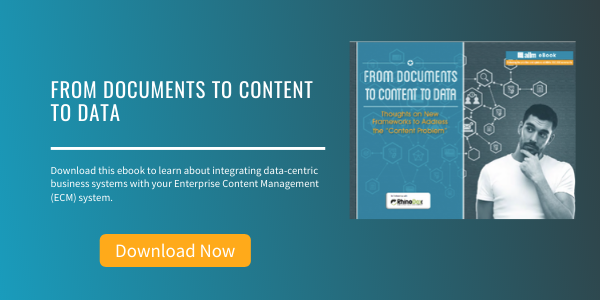
8 Things Small Businesses Need to Know about Document Management
-
You are not too small for Document Management.
Size doesn’t matter; the junk drawer in your kitchen is just as big a headache as the pile of boxes in your garage. Not addressing document management means you are likely to fail at some point to find the right information for the job. It also means you might be paying to keep information you no longer need. If you’re big enough to get sued, you’re big enough to be forced into e-discovery. If you plan to stay in business, you are going to have new employees at some point. Document Management addresses all these issues.
-
Document Management offers value beyond the obvious.
Even small businesses can save money by reducing the cost of document storage. Beyond saving money, effective document management can improve the timeliness of your responses to your customers. Document Management can also improve the quality of those responses. Both of these benefits can help distinguish you from your competition. Document Management also improves knowledge transfer to new workers, aids in cross-training, and reduces the cost of researching problems. These things make your operation more effective, allowing you to absorb more business volume into your existing staff.
-
Document Management is not a technology project.
Technical solutions may make the task of managing documents easier, but technology doesn’t drive the bus, and it doesn’t own the road. Document Management requires that a company consider what documents you have, who need access, in what form, and through what channel will they want that access to flow. You also have to address how long documents should be kept. Those answers should come from the owners and users of information and the people familiar with the regulations affecting your company. These answers then help form the requirements of the technology solutions.
-
Management support is required.
To overcome “... but we have always done <whatever> this way,” you are going to need management support. To get management support, you need to know what you are asking of the company, and you need to explain what Document Management has to offer. If you are in management, you need to look beyond your department and consider the needs of others.
-
Document Management includes costs that are not obvious.
You may end up saving money, improving response time, and accuracy, but Document Management isn’t free. You may have to invest in technology to support Document Management; you should plan to invest in training. You may decide to backfill some content that is currently in a difficult to manage form – this may involve scanning or conversion. Once you bring documents under a management regimen, you are going to have things to maintain, things to back up, and things to migrate from one generation to the next.
-
Document Management technology doesn’t have to be expensive.
There are free and Open Source document management platforms available. Microsoft SharePoint (our choice) is not free, but it’s not prohibitively expensive and offers many benefits beyond Document Management. You can put Document Management in the Cloud if you’re comfortable with the service provider. You could probably even implement Document Management practices within traditional file-sharing technologies, but I wouldn’t want to try.
-
Education is important and available.
More than anything, when you implement Document Management, you are changing behavior. You are going to be asking people to spend extra time and put forth extra effort, primarily for the benefit of others. Consider the time involved with the proper classification of documents and the addition of metadata. If I wrote a document, I might argue that I don’t need either of those. But, if I want my coworkers to be able to find my document, both are essential. People have to be trained to understand the benefit of these actions, and they have to be trained in how to perform those tasks in order to achieve the benefits.
Education is available from many sources, and much of it is free. There are tons of forums on LinkedIn, blogs on AIIM’s website and the websites of companies involved in this industry, and digital magazines and e-Newsletters specializing on every nuance of document management. Depending on the scope of your project, you may also want to consider fee-based education. I can honestly say that attending AIIM’s ECM Master Course was the best decision I’ve made many in years. Document Management can require a long-term effort, and having someone on your team that knows where to go and what to do is critical.
-
All vendors are not created equal.
If you need outside help, give careful consideration to the vendor you connect with. You must make sure the people you are working with understand the technology you will be using and the goals you have for the implementation. They should be familiar with Document Management projects, and they should be able to point to past success and qualifications in the field of Document Management. Again, you may need a vendor that isn’t associated with the technology but understands Document Management or Content Management and help get your company moving in the right direction.
About Dan Antion
Dan Antion is the former Chairman of the AIIM Board of Directors. He has spent almost 40 years developing information management systems, in a wide variety of industries. For the past 30 years, he has been Vice President, Information Services for American Nuclear Insurers, where he is responsible for data, content, and systems development across a broad range of platforms. His opinions do not represent American Nuclear Insurers, AIIM or the AIIM Board of Directors.



